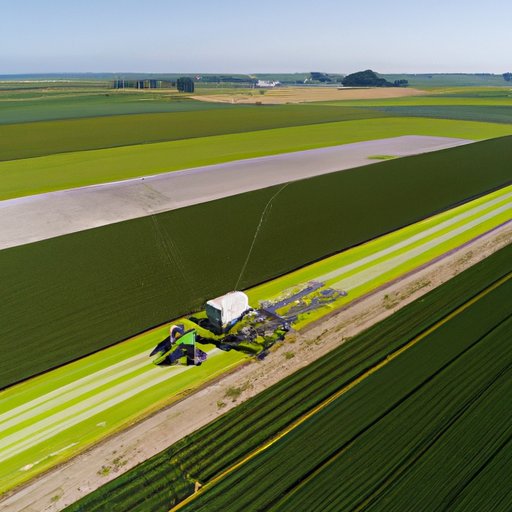Introduction
The Netherlands is a small country with an impressive agricultural sector. Despite having only 0.4% of the world’s landmass, it produces 2.5% of the world’s food. This impressive feat is largely due to the country’s reliance on technology in agriculture. Dutch agriculture is critically dependent upon technology, from automation to data-driven decision making. In this article, we will explore why this is the case.

Examining the Role of Technology in Dutch Agriculture
Automation plays a major role in Dutch agriculture. Automated machines are used for many tasks, including planting, harvesting, and spraying. According to Jeroen van den Hoven, professor of ethics and technology at Delft University of Technology, “Robots are already being used in the Netherlands to plant seeds, pick tomatoes and drive tractors.” Automation has allowed farmers to reduce labor costs and increase efficiency.
In addition to automation, technological innovation is also driving production in Dutch agriculture. Farmers are using advanced sensors and cameras to monitor soil health, crop growth, and pest activity. These technologies allow farmers to optimize their operations and increase yields. For example, the Netherlands is home to the world’s first fleet of autonomous, self-driving tractors. The tractors are equipped with sensors, cameras, and lasers to detect weeds and pests, as well as to measure soil moisture and nutrient levels.
Precision farming is another area where technology is playing an important role in Dutch agriculture. Precision farming involves using advanced technologies to reduce inputs such as water, fertilizer, and pesticides. By using technologies such as drones, sensors, and GPS tracking, farmers can monitor their crops more closely and make more informed decisions about when and how much to apply inputs.
Investigating How Data-Driven Decision Making Impacts Dutch Agriculture
Data-driven decision making is a key component of Dutch agriculture. Farmers are able to use data collected from sensors and other technologies to make more informed decisions about their operations. This information can be used to improve crop yields, reduce inputs, and better manage risks. For example, farmers can use data to identify areas of their fields that require more attention or may be prone to disease.
Data-driven decision making is also being used to improve animal welfare. Farmers are using sensors and other technologies to monitor the health and well-being of their livestock. This data can be used to identify potential problems early on and take action to prevent them. Additionally, data is used to analyze the impact of different management practices on animal health and welfare.
Discussing the Critical Dependence of Dutch Agriculture on Technology
Technology has numerous advantages for Dutch agriculture. Automation has allowed farmers to reduce labor costs and increase efficiency. Technological innovations have enabled farmers to optimize their operations and increase yields. And precision farming has allowed farmers to reduce inputs and better manage risks. All of these benefits have enabled Dutch farmers to remain competitive in the global market.
However, there are also risks associated with the critical dependence of Dutch agriculture on technology. There is a concern that relying too heavily on technology could lead to a lack of understanding of traditional farming methods. Additionally, there is a risk of technology being used for unethical purposes, such as exploiting workers or increasing environmental damage. Finally, there is a risk of data breaches or cyberattacks, which could put sensitive information at risk.
Conclusion
Dutch agriculture is critically dependent upon technology. Technologies such as automation, precision farming, and data-driven decision making have enabled Dutch farmers to remain competitive in the global market. However, there are risks associated with this dependence, including a lack of understanding of traditional farming methods and potential misuse of technology. It is important for farmers to weigh the benefits and risks of technology before adopting it in their operations.
In conclusion, technology has been a boon for Dutch agriculture, allowing farmers to reduce labor costs, increase efficiency, and optimize their operations. However, it is important to understand the risks associated with technology dependence in order to ensure that it is used responsibly and ethically.
(Note: Is this article not meeting your expectations? Do you have knowledge or insights to share? Unlock new opportunities and expand your reach by joining our authors team. Click Registration to join us and share your expertise with our readers.)
